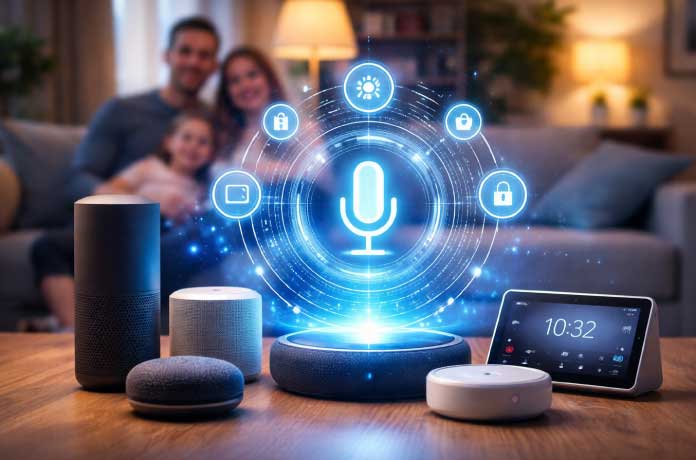Artificial Intelligence (AI) and smart technology are transforming the way we live in our homes. Everyday appliances are getting a smart upgrade from your kitchen to your laundry room. These smart devices are designed to make our lives more convenient, efficient, and even environmentally friendly. In this article, we will explore how AI and smart technologies are transforming the world of home appliances.
Smart Appliances for Everyday Life
Home appliances that are AI-powered are not just devices. They are also turning into helpful partners in daily life. These appliances learn from your routines, analyze information and make decisions to improve themselves.
- Smart washing machines identify the fabric and how dirty it is, then automatically pick the best cycle, water level, and detergent, giving you a thorough clean while cutting down on water and power use.
- Smart refrigerators can track what food you have, remind you when items are about to expire, suggest recipes based on what’s inside, and even help with grocery lists.
- Robotic vacuum cleaners use sensors to map out your home, avoid obstacles, and stick to a cleaning schedule that suits your routine—all with barely any effort on your part.
These appliances are equipped with sensors and software that allow them to adjust and adapt, making daily chores much easier.
Key Features of Smart Home Appliances
-
Automation and Control
One of the most appealing features of smart home appliances is automation. These devices can be controlled remotely using smartphone apps or connected through a smart home hub. For example, you can start your washing machine while at home or outside.
Many appliances also support scheduling. For example, you can program your dishwasher to run at night when energy costs are lower. Some smart appliances can connect and coordinate with each other to seamlessly fit into your daily routine.
-
Voice Command
Voice control is the next level of your Smart Home Appliances. Voice control makes things even easier. You can talk to smart appliances using assistants like Alexa, Google Assistant, or Siri, and they’ll do what you say. You can say, “Turn on the oven” or “Start the vacuum,” and the appliance will respond instantly.
This feature is convenient for individuals with mobility issues or those who need to multitask, such as cooking while holding a baby or working from home.
-
Preventive Maintenance
AI-powered appliances can monitor their condition and alert users to potential issues before they become significant problems. For example, your intelligent washing machine can tell when a part is starting to wear out and send a message to your phone. This early warning system helps you identify and address minor problems before they escalate into larger issues. It also helps your machine last longer and break down less often.
-
Energy Efficiency
A major perk of smart home appliances is how they cut energy use. They learn your habits and tweak their settings to avoid wasting power.
Smart fridges switch to energy-saving mode when you’re not opening them much, and smart thermostats turn the heat down while you’re away. These small tweaks can trim your power bills and lighten your environmental footprint.
Benefits of Smart and AI-Powered Appliances
Enhanced Convenience
Smart appliances are made to make life easier. They can do things like make your coffee in the morning, suggest recipes for dinner or change the temperature in your home based on the weather. They learn what you want and how you live so your home fits your needs without you having to do much.
Time and Cost Savings
By automating daily chores, smart appliances give you more free time. You spend less time doing laundry, cleaning, or cooking. Predictive maintenance and energy-efficient performance also mean fewer repair bills and lower utility costs over time.
Improved Safety and Security
Many smart appliances are equipped with features that enhance home safety and security. Smart ovens can turn off automatically if left unattended for too long. Security systems with AI can detect unusual activity using cameras and sensors, sending real-time alerts to your phone.
In addition, appliances with remote monitoring allow you to check their status and control them from anywhere. This adds peace of mind, especially when you’re away from home.
Smart Refrigerators
These smart fridges have sensors and internet access. They can keep track of food expiration dates, suggest meals with what you have, and connect to your phone to help with your shopping list. Some even connect with other smart kitchen devices for a seamless cooking experience.
Intelligent Washers and Dryers
These washers fine-tune their settings for every fabric, and some even spot stains and pick the ideal cycle to remove them. That keeps your clothes looking good while saving water and energy.
Robotic Vacuum Cleaners
Using AI algorithms and mapping technology, these vacuums navigate your home with precision. They avoid obstacles, learn which areas need more attention, and clean according to a schedule or command.
AI Cooking Appliances
From ovens that guide you through recipes to cooktops that adjust heat based on the dish, these appliances help even novice cooks make great meals. They eliminate the guesswork from cooking and ensure consistent results.
Smart Home Apps
Apps like SmartHQ allow you to control multiple appliances from one place. You can see how your laundry is going, heat your oven, or get maintenance alerts—all from your phone.
The Future of Smart Home Appliances
Looking ahead, smart appliances will become even more intelligent and connected. Here are a few trends to watch:
- Better voice assistants that understand complex instructions and context.
- Cross-brand compatibility enables appliances from different manufacturers to work together seamlessly.
- Advanced inventory tracking in refrigerators to help reduce food waste.
- Noise detection in washers and dryers to identify mechanical issues before they worsen.
These innovations will lead to the development of smart homes.
Challenges and Considerations
Even though smart home appliances have lots of benefits there are a few downsides:
- Cost: High-tech features often mean higher prices which can be a barrier for some consumers.
- Privacy: As these devices collect data, it’s essential to understand how your information is being used and protected.
- Complexity: Advanced features can sometimes make appliances harder to repair or require professional service.
Manufacturers need to balance fresh ideas, affordability, safety and simplicity so everyone can enjoy these technologies.
Conclusion
AI and innovative technologies are revolutionising the capabilities of home appliances. Smart home appliances make life easier by saving time, using less energy, and helping keep your home safe. As they continue to improve, we can expect a future where these devices not only assist us but also learn what we need and perform tasks for us automatically.
By embracing this smart revolution, homeowners can enjoy more time, lower costs, and a more sustainable lifestyle—all with the help of intelligent technology.



